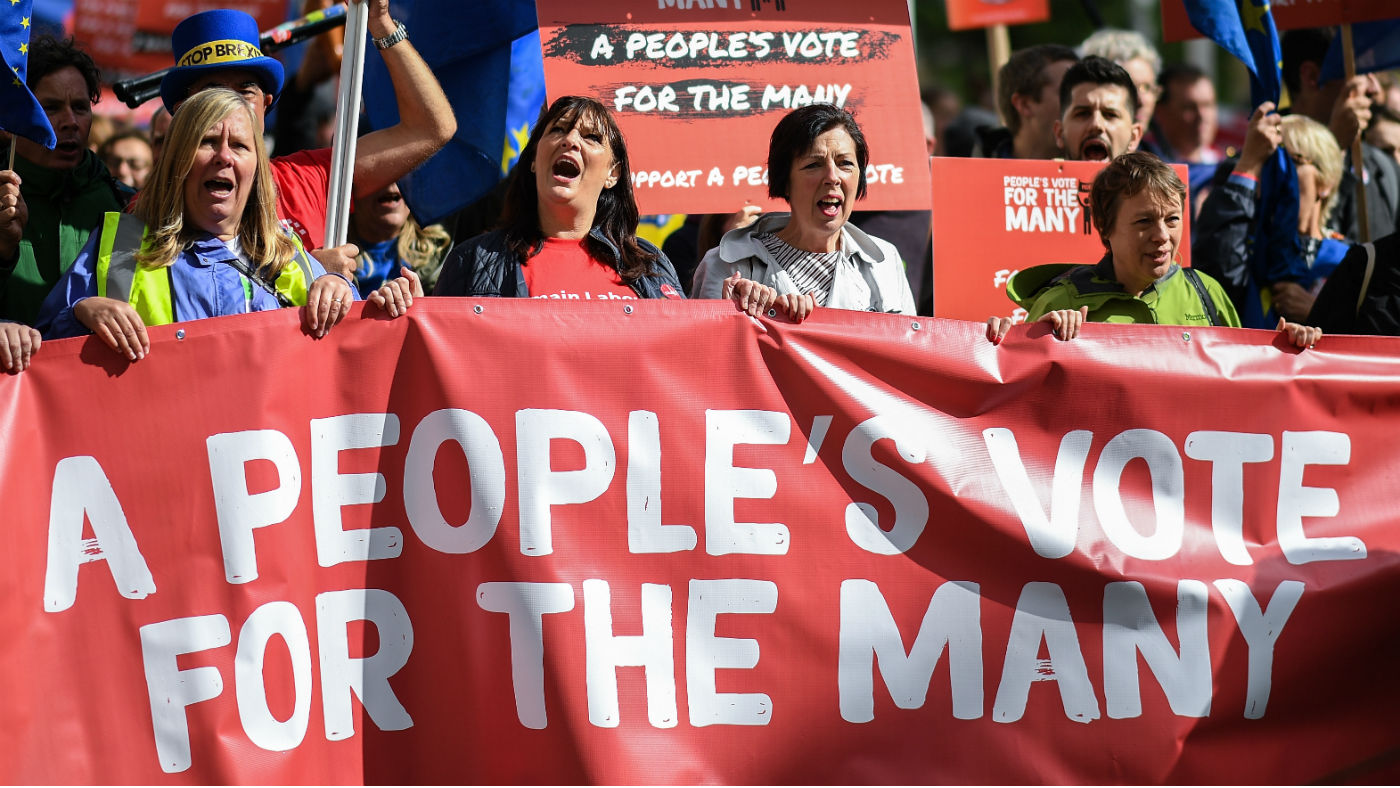Jeremy Corbyn opens door to second referendum
Labour members to vote on keeping ‘all options remaining on the table, including campaigning for a public vote’

A free daily email with the biggest news stories of the day – and the best features from TheWeek.com
You are now subscribed
Your newsletter sign-up was successful
Labour members will vote on a motion committing the party to keeping “all options on the table” on Brexit, including potentially campaigning for a new referendum.
Senior party delegates have agreed on the wording for a motion to be put to the party conference in Liverpool on Tuesday about what the party should do about Brexit if it cannot get a general election.
The motion says: “If we cannot get a general election, Labour must support all options remaining on the table, including campaigning for a public vote.”
The Week
Escape your echo chamber. Get the facts behind the news, plus analysis from multiple perspectives.

Sign up for The Week's Free Newsletters
From our morning news briefing to a weekly Good News Newsletter, get the best of The Week delivered directly to your inbox.
From our morning news briefing to a weekly Good News Newsletter, get the best of The Week delivered directly to your inbox.
It adds: “If the government is confident in negotiating a deal that working people, our economy and communities will benefit from, they should not be afraid to put that deal to the public.”
Yesterday, Labour leader Jeremy Corbyn said he would back a second Brexit referendum if Labour members voted for it at this week’s conference, signalling a major shift in party policy.
Speaking to the BBC’s Andrew Marr as the party faithful gathered in Liverpool, Corbyn said he would be “bound by the democracy of our party” were members to vote in favour of a second referendum, although he added he would wait and see what wording would be put in front of the delegates after a meeting on Sunday evening.
A debate on a second ‘People’s vote’ was called for by over 100 constituencies. According to a YouGov survey of 1,054 Labour members, commissioned by the People's Vote campaign, 86% wanted a final, public say on the outcome of Brexit negotiations, against 8% who opposed it.
A free daily email with the biggest news stories of the day – and the best features from TheWeek.com
The Sunday Telegraph says Corbyn’s comments “pave the way for a significant change in Labour’s Brexit policy”, and come just two days after Theresa May urged the Labour leader to clarify his position on Brexit, “amid concern that a Labour U-turn could jeopardise any deal reached with Brussels and prevent the UK from leaving the EU”.
The party has never formally rejected the option of a further vote but both Corbyn and his deputy, Tom Watson, have indicated they would prefer it to be resolved by a general election.
A YouGov poll conducted last week found the party could win enough extra votes to bring it to the brink of general election victory by backing a second referendum.
Thousands marched in Liverpool over the weekend calling for a second vote on the final terms of the Brexit deal, which has shown steadily growing public support in recent months as the government’s negotiating strategy has floundered.
The Labour leadership has been under intense pressure to shift its position on a second referendum, led by a cabal of Remain-supporting MPs and, crucially, a growing number of unions.
Speaking separately to the BBC’s Peinaar’s Politics yesterday, Len McLusky, the leader of Britain’s biggest union Unite which is also Labour’s leading donor, threw his support behind a second referendum, but said the option of staying in the EU should not be on the ballot, and rather the public should choose between whether to endorse May’s final deal or opt for no deal at all.
Despite the shift in Labour party policy “there are still many obstacles in the way of a referendum” says John Rentoul in The Independent. He said “I think it would only become a possibility if Theresa May fails to reach an agreement with the EU. That would, incidentally, resolve the problem of the question wording: the referendum would then be a choice between leaving the EU without a deal, or remaining”.
However, Labour’s primary strategy appears to be forcing the government into an early general election, something the Brexit Secretary, Dominic Raab, categorially ruled out on Sunday.
It follows reports in The Sunday Times that Theresa May’s aides have secretly begun contingency planning for a snap election in November to save the Brexit talks and her job after EU leaders rebuffed the prime minister’s Chequers plan.
In a bid to force an early election, Corbyn has said Labour would be prepared to vote down the prime minister’s final Brexit deal when it is put to the Commons in November, if it did not meet a series of tests Labour has set out, specifically if it waters down workers’ rights and environmental protections.